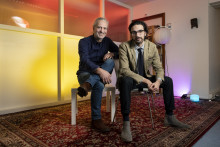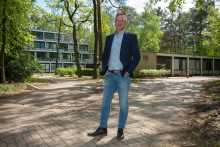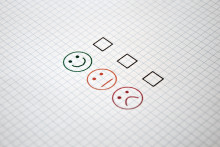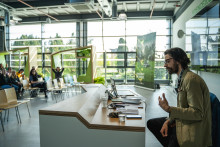Why did you start this initiative?
‘When I started my study Psychology at the UT, I found the programme to be very restrictive, even dead in a way. I didn’t want to learn via a detached secondhand experience. So in the meantime I went ‘rogue’ and explored meditation, mindfulness, the method of ice man Wim Hof and psychedelics. They all felt more efficient and effective than the university way. It made me feel independent and in control.’
‘Still, as the university had too much structure, on my own adventure I didn’t have any structure at all. At a certain point I felt like I was in an analysis paralysis. I simply had too much information and there was no community or other resources to fall back on. Starting The Collective Unconscious was a way to bring both worlds together.’
How does this program fit in that picture?
‘This program is basically version 2.0 of what we started with earlier this year, with our own space in the Bastille and a whole range of different activities like a Wednesday Women’s Circle or Film & Philosophy nights. Over the course of six months, we had 800 attendances, by 150 to 200 different people. And participants gave great testimonials about their improved mental wellbeing. So there was some qualitative evidence that our method worked. Now we also want quantitative evidence. In this program, participants will use an app to track their progress. After the six months of this program, we can see which tools, techniques and workshops are the most efficient, as well as the most cost-effective.’
What else is there for participants?
‘What we’re providing is a bit of structure in wellbeing, personal development and being a community. Once people have enrolled and commit their time and energy, we help to create a personal plan, we offer a variety of workshops and you’re part of your own smaller tribe of five students. You’ll also be assigned a facilitator: a UT psychology student who is responsible for helping you out. Not as a pilot, but as a flight attendant, so to speak. This is a program by students, with students.’
So people won’t be getting help from experts?
‘No, we clearly state that this is not a replacement for professional therapy. If you look at the waiting list to go to a therapist, it can take months. If you take a heartfelt conversation with a friend as the bottom line and getting help from a professional therapist as the top, we’re somewhere in between. This is because mental health isn’t black and white. Sick or healthy. There’s a gradient of grey. And someone who is feeling isolated, tired or sad is much different than someone with depression, anxiety, or even more serious disorders. We need to acknowledge this. I like to compare it to home repairs. If I would have to replace all the pipes, I would hire a contractor. If it’s painting a wall, that’s something I can do myself. One of the big questions we’re asking with this program is: what is the efficiency and cost-effectiveness of an expert versus our community-driven program? Let’s find that out.’
It also looks like you’re specifically targeting international students. How so?
‘The program is for everyone, but I do feel that their situation requires more attention. The university goes out, spends a marketing budget on telling students from the other side of the world about all the glitter and glamour here. And it’s there, during the Kick-In. But when that’s all said and done, what’s left? Even finding food can be straining to a person in such a situation and I feel we don’t have enough honest conversations about that. If you speak to international students, many of them feel tricked by the university.’
Do you think you will offer a better program than the plan the university is working on?
‘I know the UT is working on a plan for student well-being, but I don’t think they will have a program that works. On paper maybe, but not in reality. Then again, mental health and the well-being of students isn’t a competition. I would much rather collaborate with the university, but it’s impossible to find someone to talk to. I get ignored or dismissed and I feel like people at the UT are too focused on high tech, with not enough human touch.’







